Managing Complex Projects: Strategies and Challenges
VerifiedAdded on 2023/04/21
|6
|1321
|129
Essay
AI Summary
This essay provides an overview of complex project management, highlighting the importance of skills and strategies required to manage intricate projects effectively. It discusses the challenges associated with complex projects, such as incorrect resource estimation, poor communication, and lack of stakeholder involvement. The essay also explores the concept of managerial complexity, emphasizing the need for project managers to distinguish between complicated, difficult, and complex scenarios. It further examines the dynamic and structural aspects of project complexity and the application of parametric estimating in improving project outcomes. The essay concludes by advocating for the use of parametric estimating in projects to reconcile issues related to schedule and cost estimates, ultimately enhancing project success. Desklib offers a wealth of similar resources for students.

Complex Project Management 1
Complex Project Management
Name
Institution Affiliation
State/city
Date
Complex Project Management
Name
Institution Affiliation
State/city
Date
Paraphrase This Document
Need a fresh take? Get an instant paraphrase of this document with our AI Paraphraser
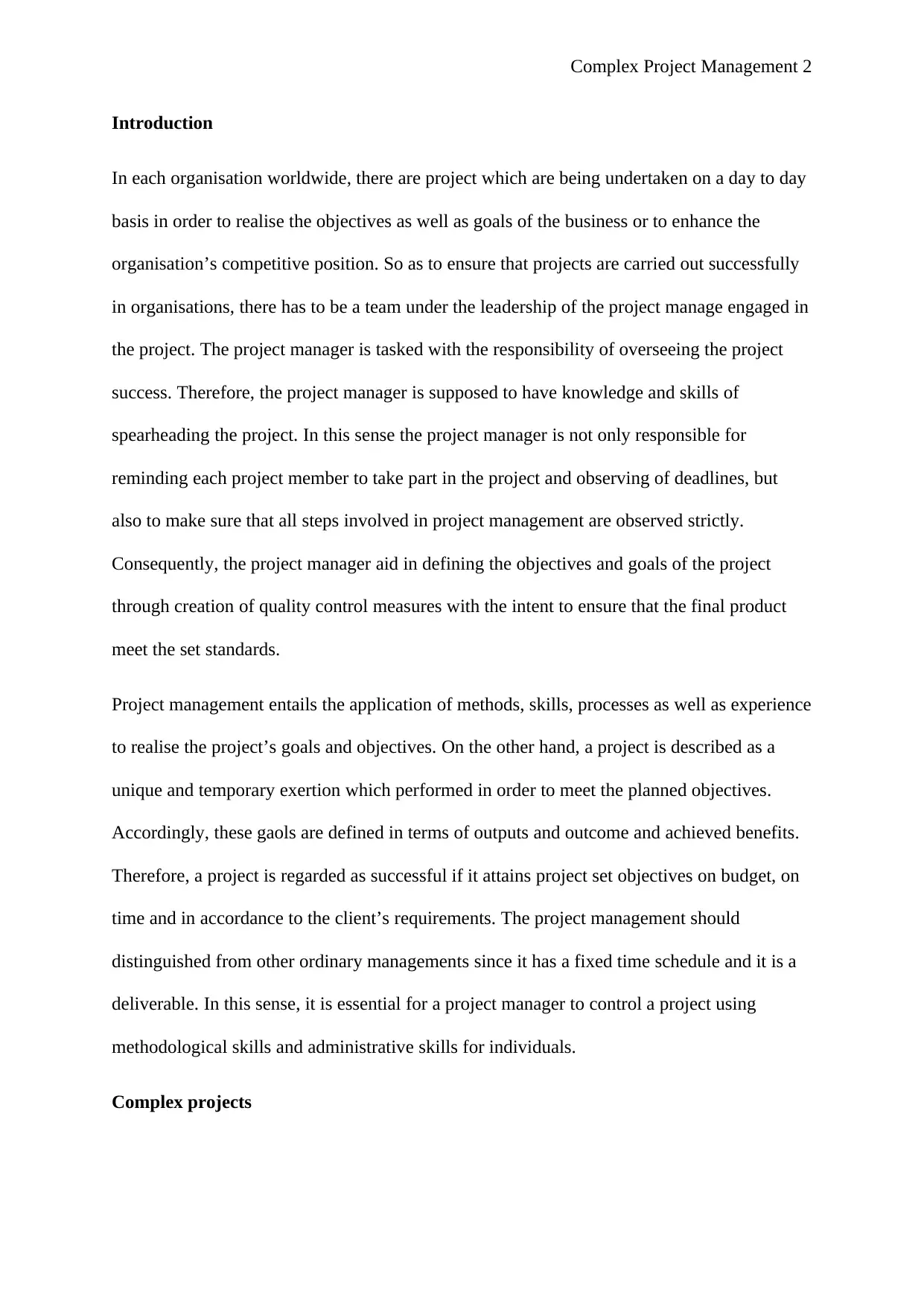
Complex Project Management 2
Introduction
In each organisation worldwide, there are project which are being undertaken on a day to day
basis in order to realise the objectives as well as goals of the business or to enhance the
organisation’s competitive position. So as to ensure that projects are carried out successfully
in organisations, there has to be a team under the leadership of the project manage engaged in
the project. The project manager is tasked with the responsibility of overseeing the project
success. Therefore, the project manager is supposed to have knowledge and skills of
spearheading the project. In this sense the project manager is not only responsible for
reminding each project member to take part in the project and observing of deadlines, but
also to make sure that all steps involved in project management are observed strictly.
Consequently, the project manager aid in defining the objectives and goals of the project
through creation of quality control measures with the intent to ensure that the final product
meet the set standards.
Project management entails the application of methods, skills, processes as well as experience
to realise the project’s goals and objectives. On the other hand, a project is described as a
unique and temporary exertion which performed in order to meet the planned objectives.
Accordingly, these gaols are defined in terms of outputs and outcome and achieved benefits.
Therefore, a project is regarded as successful if it attains project set objectives on budget, on
time and in accordance to the client’s requirements. The project management should
distinguished from other ordinary managements since it has a fixed time schedule and it is a
deliverable. In this sense, it is essential for a project manager to control a project using
methodological skills and administrative skills for individuals.
Complex projects
Introduction
In each organisation worldwide, there are project which are being undertaken on a day to day
basis in order to realise the objectives as well as goals of the business or to enhance the
organisation’s competitive position. So as to ensure that projects are carried out successfully
in organisations, there has to be a team under the leadership of the project manage engaged in
the project. The project manager is tasked with the responsibility of overseeing the project
success. Therefore, the project manager is supposed to have knowledge and skills of
spearheading the project. In this sense the project manager is not only responsible for
reminding each project member to take part in the project and observing of deadlines, but
also to make sure that all steps involved in project management are observed strictly.
Consequently, the project manager aid in defining the objectives and goals of the project
through creation of quality control measures with the intent to ensure that the final product
meet the set standards.
Project management entails the application of methods, skills, processes as well as experience
to realise the project’s goals and objectives. On the other hand, a project is described as a
unique and temporary exertion which performed in order to meet the planned objectives.
Accordingly, these gaols are defined in terms of outputs and outcome and achieved benefits.
Therefore, a project is regarded as successful if it attains project set objectives on budget, on
time and in accordance to the client’s requirements. The project management should
distinguished from other ordinary managements since it has a fixed time schedule and it is a
deliverable. In this sense, it is essential for a project manager to control a project using
methodological skills and administrative skills for individuals.
Complex projects
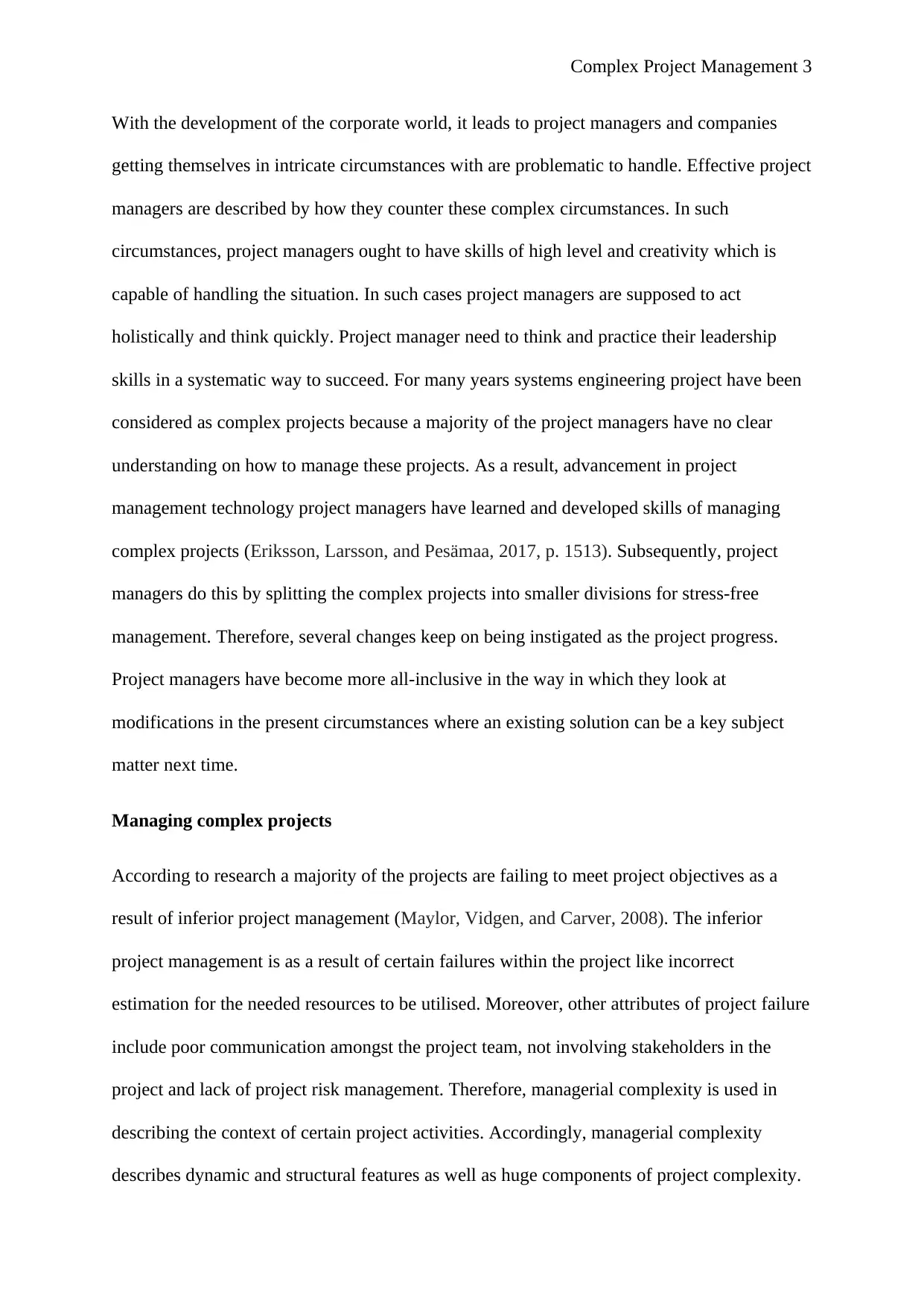
Complex Project Management 3
With the development of the corporate world, it leads to project managers and companies
getting themselves in intricate circumstances with are problematic to handle. Effective project
managers are described by how they counter these complex circumstances. In such
circumstances, project managers ought to have skills of high level and creativity which is
capable of handling the situation. In such cases project managers are supposed to act
holistically and think quickly. Project manager need to think and practice their leadership
skills in a systematic way to succeed. For many years systems engineering project have been
considered as complex projects because a majority of the project managers have no clear
understanding on how to manage these projects. As a result, advancement in project
management technology project managers have learned and developed skills of managing
complex projects (Eriksson, Larsson, and Pesämaa, 2017, p. 1513). Subsequently, project
managers do this by splitting the complex projects into smaller divisions for stress-free
management. Therefore, several changes keep on being instigated as the project progress.
Project managers have become more all-inclusive in the way in which they look at
modifications in the present circumstances where an existing solution can be a key subject
matter next time.
Managing complex projects
According to research a majority of the projects are failing to meet project objectives as a
result of inferior project management (Maylor, Vidgen, and Carver, 2008). The inferior
project management is as a result of certain failures within the project like incorrect
estimation for the needed resources to be utilised. Moreover, other attributes of project failure
include poor communication amongst the project team, not involving stakeholders in the
project and lack of project risk management. Therefore, managerial complexity is used in
describing the context of certain project activities. Accordingly, managerial complexity
describes dynamic and structural features as well as huge components of project complexity.
With the development of the corporate world, it leads to project managers and companies
getting themselves in intricate circumstances with are problematic to handle. Effective project
managers are described by how they counter these complex circumstances. In such
circumstances, project managers ought to have skills of high level and creativity which is
capable of handling the situation. In such cases project managers are supposed to act
holistically and think quickly. Project manager need to think and practice their leadership
skills in a systematic way to succeed. For many years systems engineering project have been
considered as complex projects because a majority of the project managers have no clear
understanding on how to manage these projects. As a result, advancement in project
management technology project managers have learned and developed skills of managing
complex projects (Eriksson, Larsson, and Pesämaa, 2017, p. 1513). Subsequently, project
managers do this by splitting the complex projects into smaller divisions for stress-free
management. Therefore, several changes keep on being instigated as the project progress.
Project managers have become more all-inclusive in the way in which they look at
modifications in the present circumstances where an existing solution can be a key subject
matter next time.
Managing complex projects
According to research a majority of the projects are failing to meet project objectives as a
result of inferior project management (Maylor, Vidgen, and Carver, 2008). The inferior
project management is as a result of certain failures within the project like incorrect
estimation for the needed resources to be utilised. Moreover, other attributes of project failure
include poor communication amongst the project team, not involving stakeholders in the
project and lack of project risk management. Therefore, managerial complexity is used in
describing the context of certain project activities. Accordingly, managerial complexity
describes dynamic and structural features as well as huge components of project complexity.
⊘ This is a preview!⊘
Do you want full access?
Subscribe today to unlock all pages.

Trusted by 1+ million students worldwide
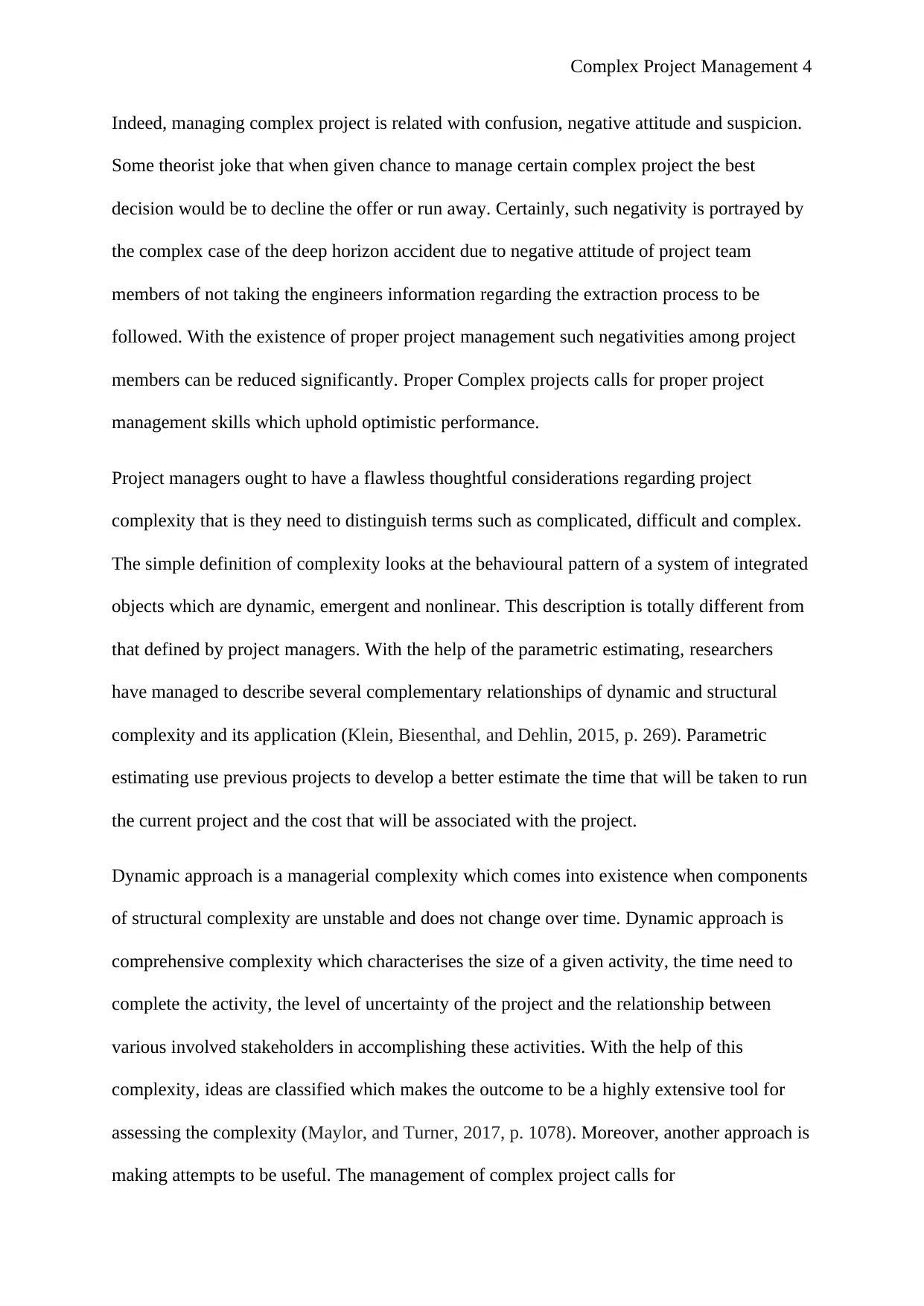
Complex Project Management 4
Indeed, managing complex project is related with confusion, negative attitude and suspicion.
Some theorist joke that when given chance to manage certain complex project the best
decision would be to decline the offer or run away. Certainly, such negativity is portrayed by
the complex case of the deep horizon accident due to negative attitude of project team
members of not taking the engineers information regarding the extraction process to be
followed. With the existence of proper project management such negativities among project
members can be reduced significantly. Proper Complex projects calls for proper project
management skills which uphold optimistic performance.
Project managers ought to have a flawless thoughtful considerations regarding project
complexity that is they need to distinguish terms such as complicated, difficult and complex.
The simple definition of complexity looks at the behavioural pattern of a system of integrated
objects which are dynamic, emergent and nonlinear. This description is totally different from
that defined by project managers. With the help of the parametric estimating, researchers
have managed to describe several complementary relationships of dynamic and structural
complexity and its application (Klein, Biesenthal, and Dehlin, 2015, p. 269). Parametric
estimating use previous projects to develop a better estimate the time that will be taken to run
the current project and the cost that will be associated with the project.
Dynamic approach is a managerial complexity which comes into existence when components
of structural complexity are unstable and does not change over time. Dynamic approach is
comprehensive complexity which characterises the size of a given activity, the time need to
complete the activity, the level of uncertainty of the project and the relationship between
various involved stakeholders in accomplishing these activities. With the help of this
complexity, ideas are classified which makes the outcome to be a highly extensive tool for
assessing the complexity (Maylor, and Turner, 2017, p. 1078). Moreover, another approach is
making attempts to be useful. The management of complex project calls for
Indeed, managing complex project is related with confusion, negative attitude and suspicion.
Some theorist joke that when given chance to manage certain complex project the best
decision would be to decline the offer or run away. Certainly, such negativity is portrayed by
the complex case of the deep horizon accident due to negative attitude of project team
members of not taking the engineers information regarding the extraction process to be
followed. With the existence of proper project management such negativities among project
members can be reduced significantly. Proper Complex projects calls for proper project
management skills which uphold optimistic performance.
Project managers ought to have a flawless thoughtful considerations regarding project
complexity that is they need to distinguish terms such as complicated, difficult and complex.
The simple definition of complexity looks at the behavioural pattern of a system of integrated
objects which are dynamic, emergent and nonlinear. This description is totally different from
that defined by project managers. With the help of the parametric estimating, researchers
have managed to describe several complementary relationships of dynamic and structural
complexity and its application (Klein, Biesenthal, and Dehlin, 2015, p. 269). Parametric
estimating use previous projects to develop a better estimate the time that will be taken to run
the current project and the cost that will be associated with the project.
Dynamic approach is a managerial complexity which comes into existence when components
of structural complexity are unstable and does not change over time. Dynamic approach is
comprehensive complexity which characterises the size of a given activity, the time need to
complete the activity, the level of uncertainty of the project and the relationship between
various involved stakeholders in accomplishing these activities. With the help of this
complexity, ideas are classified which makes the outcome to be a highly extensive tool for
assessing the complexity (Maylor, and Turner, 2017, p. 1078). Moreover, another approach is
making attempts to be useful. The management of complex project calls for
Paraphrase This Document
Need a fresh take? Get an instant paraphrase of this document with our AI Paraphraser
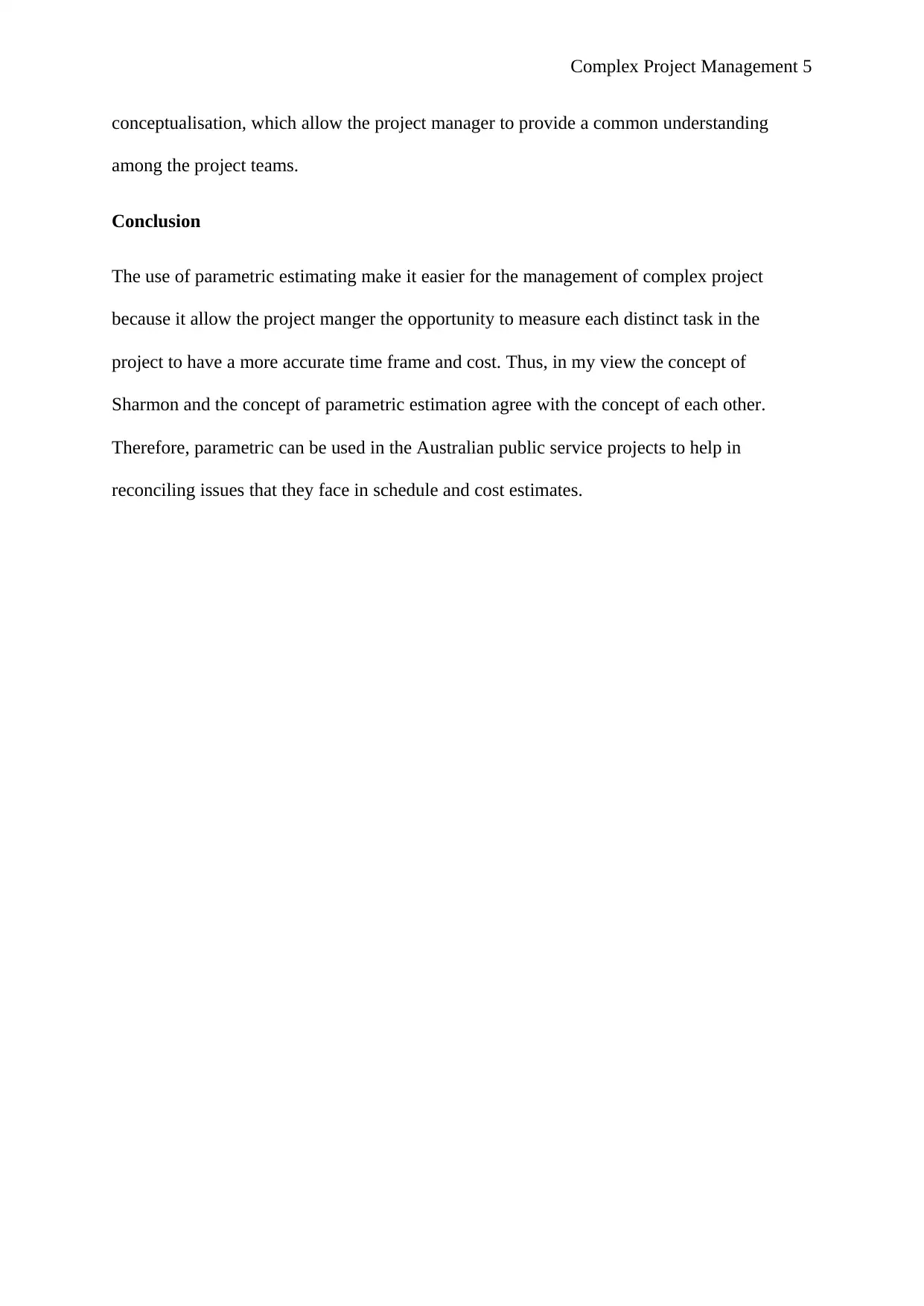
Complex Project Management 5
conceptualisation, which allow the project manager to provide a common understanding
among the project teams.
Conclusion
The use of parametric estimating make it easier for the management of complex project
because it allow the project manger the opportunity to measure each distinct task in the
project to have a more accurate time frame and cost. Thus, in my view the concept of
Sharmon and the concept of parametric estimation agree with the concept of each other.
Therefore, parametric can be used in the Australian public service projects to help in
reconciling issues that they face in schedule and cost estimates.
conceptualisation, which allow the project manager to provide a common understanding
among the project teams.
Conclusion
The use of parametric estimating make it easier for the management of complex project
because it allow the project manger the opportunity to measure each distinct task in the
project to have a more accurate time frame and cost. Thus, in my view the concept of
Sharmon and the concept of parametric estimation agree with the concept of each other.
Therefore, parametric can be used in the Australian public service projects to help in
reconciling issues that they face in schedule and cost estimates.
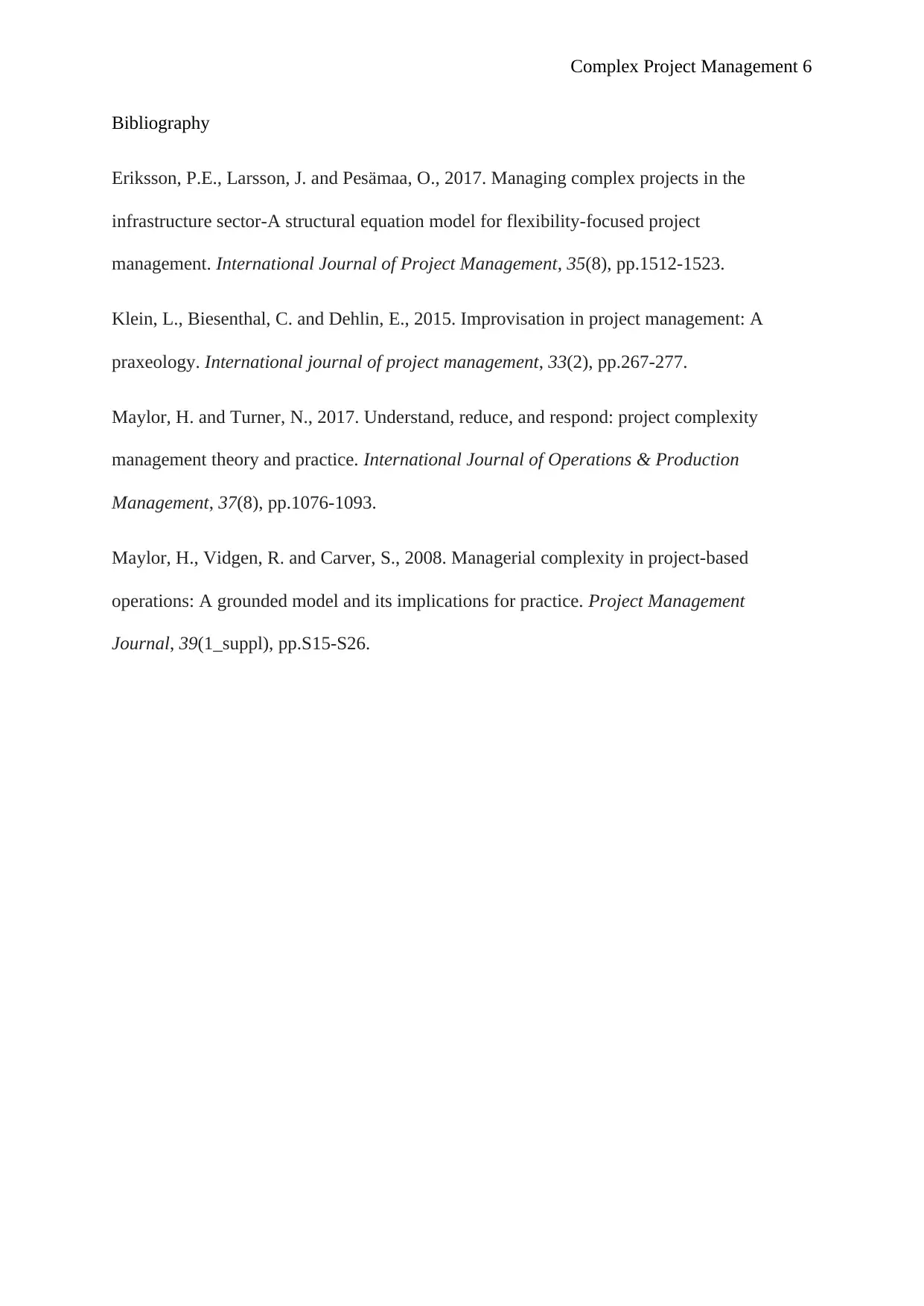
Complex Project Management 6
Bibliography
Eriksson, P.E., Larsson, J. and Pesämaa, O., 2017. Managing complex projects in the
infrastructure sector-A structural equation model for flexibility-focused project
management. International Journal of Project Management, 35(8), pp.1512-1523.
Klein, L., Biesenthal, C. and Dehlin, E., 2015. Improvisation in project management: A
praxeology. International journal of project management, 33(2), pp.267-277.
Maylor, H. and Turner, N., 2017. Understand, reduce, and respond: project complexity
management theory and practice. International Journal of Operations & Production
Management, 37(8), pp.1076-1093.
Maylor, H., Vidgen, R. and Carver, S., 2008. Managerial complexity in project-based
operations: A grounded model and its implications for practice. Project Management
Journal, 39(1_suppl), pp.S15-S26.
Bibliography
Eriksson, P.E., Larsson, J. and Pesämaa, O., 2017. Managing complex projects in the
infrastructure sector-A structural equation model for flexibility-focused project
management. International Journal of Project Management, 35(8), pp.1512-1523.
Klein, L., Biesenthal, C. and Dehlin, E., 2015. Improvisation in project management: A
praxeology. International journal of project management, 33(2), pp.267-277.
Maylor, H. and Turner, N., 2017. Understand, reduce, and respond: project complexity
management theory and practice. International Journal of Operations & Production
Management, 37(8), pp.1076-1093.
Maylor, H., Vidgen, R. and Carver, S., 2008. Managerial complexity in project-based
operations: A grounded model and its implications for practice. Project Management
Journal, 39(1_suppl), pp.S15-S26.
⊘ This is a preview!⊘
Do you want full access?
Subscribe today to unlock all pages.

Trusted by 1+ million students worldwide
1 out of 6
Related Documents
Your All-in-One AI-Powered Toolkit for Academic Success.
+13062052269
info@desklib.com
Available 24*7 on WhatsApp / Email
![[object Object]](/_next/static/media/star-bottom.7253800d.svg)
Unlock your academic potential
Copyright © 2020–2025 A2Z Services. All Rights Reserved. Developed and managed by ZUCOL.




